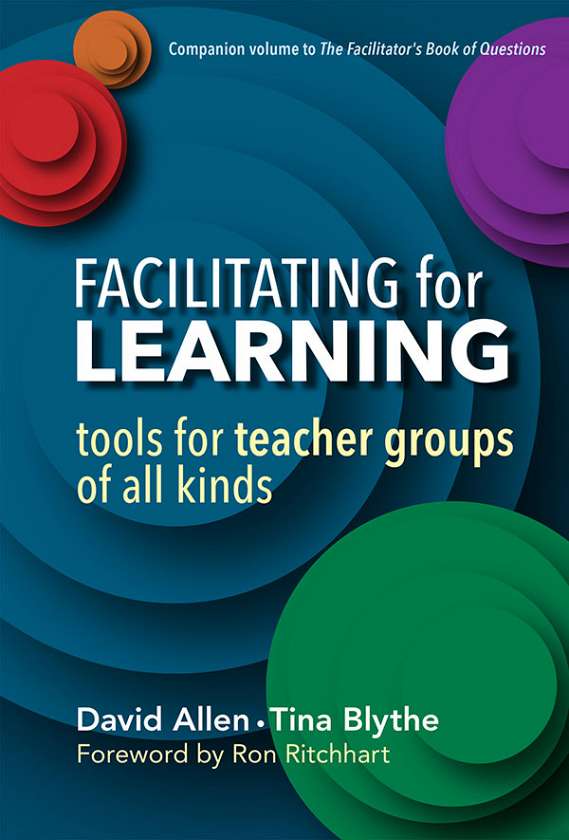Professors: Request an Exam Copy
Print copies available for US orders only. For orders outside the US, see our international distributors.
Foreword by: Ron Ritchhart
Publication Date: July 24, 2015
Pages: 144

One of the most important shifts in schools in the last two decades has been the growing emphasis on collaboration among teachers and other educators. Whether you are a teacher facilitating a group for the first time or an experienced facilitator seeking to further develop your skills, this book is for you. Organized to be both an exploration of the role of facilitating and a handbook of strategies, this resource is designed for use in a range of contexts, including faculty and department meetings, professional learning communities, grade-level teams, and inquiry groups. A perfect companion to the authors’ bestseller, The Facilitator’s Book of Questions, Facilitating for Learning extends the scope of that work by examining the facilitator’s responsibilities for supporting a group’s learning during all parts of a meeting, between meetings, and within the larger school context and culture. It is an essential resource for teachers, administrators, coaches, and teacher educators.
Book Features:
David Allen is an assistant professor at the College of Staten Island, City University of New York. Tina Blythe is an adjunct lecturer at the Harvard Graduate School of Education and an international education consultant.
"The way in which Allen and Blythe frame professional learning is refreshing: deeply learner-centered and collaborative. They are outspoken in retreating from traditional models of professional learning that are expert-driven and answer-focused. Their alternative is both practical and holistic in being question-driven and authentically collaborative."
—Adult Education Quarterly
“I have had the good fortune to watch both David and Tina facilitate learning groups and have learned from the power of their modeling…I am delighted that they have gathered their wisdom here in this volume to share with others eager to embark on the journey and experience the joys of facilitating learning with colleagues.”
—From the Foreword by Ron Ritchhart, senior research associate, Project Zero, Harvard Graduate School of Education
"Facilitating for Learning is a practice-based resource loaded with ideas, strategies, and tools designed to maximize opportunities to promote professional learning, team-based thinking, and collaborative problem solving. This book provides teacher leaders, instructional coaches, principals, and others who engage with teachers a well-curated set of tools and resources designed to promote educators’ engagement in and ownership for purposeful conversations in a variety of school settings. Allen and Blythe's approach to professional learning affirms the importance of establishing a “culture of thinking for teachers," and provides clear guidance on the use of tools needed to successfully engage teachers and others in collaborative learning processes within their schools.
—Larry Leverett, executive director, Panasonic Foundation
Table of Contents
Foreword: The "Wants" of Professional Learning by Ron Ritchhart
Acknowledgments
PART I: FACILITATING FOR LEARNING
Chapter 1. Introduction
Why a New Book on Facilitation?
What Kind of Group Learning?
Who Will Facilitate?
How Do Teachers Become Facilitators?
How Is This Book Organized?
How Does This Book Relate to The Facilitator's Book of Questions?
A Note About Terminology
Chapter 2. Facilitating for Learning
Developing a Different Story of Professional Learning
A Tale of Two Stances: Task Completion and Learning
Defining Facilitating for Learning
The Facilitator's Orientation
Facilitation and Other Roles
PART II: FACILITATING TEACHER LEARNING GROUPS: THE BASICS
Chapter 3. Preparing for the Meeting
Identify Goals
Shape the Agenda
Prepare Space and Materials
Chapter 4. Opening the Meeting
Facilitate Transition and Connection
Review Goals and Agenda
Establish or Review Norms
Establish or Review Roles or Functions
Chapter 5. Working Through the Meeting
Cultivate "Bi-Focal" Vision
Help the Group Manage Time
Help the Group Monitor Process and Progress Toward Its Goals
Help the Group Address More Complex Situations
Chapter 6. Closing the Meeting
Invite the Group to Express Appreciation
Help the Group Reflect on the Content of the Meeting
Help the Group Reflect on the Process of the Meeting
Help the Group Identify Next Steps for Its Learning and Work
Gather Documentation Artifacts from the Meeting
Restore the Space (if Necessary)
Chapter 7. Following Up on the Meeting
Continue to Gather Documentation Artifacts
Review Documentation Artifacts
Check in Informally with Participants
Communicate Formally with Participants and Other Stakeholders
PART III: OPPORTUNITIES AND CHALLENGES
Chapter 8. Managing Productive Group Interactions
Differences in Individuals' Points of View
Differences in How Individuals Engage in Meetings
Differences in How Individuals Experience a Group's Autonomy
Chapter 9. Repurposing Meetings for Learning
Analyzing Student Achievement Data
Aligning Curriculum and Instruction with Standards
Grading or Scoring Student Work
Discussing Individual Students and Their Learning
Chapter 10. Managing Challenges of School Context and Culture
Challenges Related to Time
Challenges Related to School Culture
Challenges Related to School Leadership
Chapter 11. Voices of Experience
Attention
Analogies and Metaphors
Satisfaction
Appendix: Resources
References
Index
About the Authors
Professors: Request an Exam Copy
Print copies available for US orders only. For orders outside the US, see our international distributors.